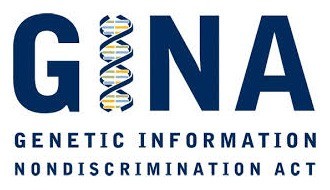Overview of GINA
GINA bans genetic discrimination in health insurance & employment
The Genetic Information Nondiscrimination Act (GINA) prohibits discrimination by health insurance plans and employers based on genetic information. “Genetic information” is defined as:
- Your genetic test results
- Your relatives’ genetic test results (up to and including fourth-degree relatives), and/or
- Information about family history of any disease or disorder
Information about your participation in research that includes genetic testing, counseling, or education is also protected.
Exceptions
GINA does not apply to life, long-term care or disability insurance. These insurers are allowed to use genetic, personal or family health information to make coverage or premium decisions. Some states have their own genetic protection laws, providing additional security against genetic discrimination for these types of insurance.
In addition, GINA does not apply to:
- Employers with less than 15 employees
- Members of the United States military
- Veterans obtaining health care through the Veteran’s Administration, or
- Federal employees enrolled in the Federal Employees Health Benefits program (FEHB)
However, the military and veterans’ health care systems have their own policies that provide protections similar to GINA. Note that there are some exceptions for individuals joining the military. These can be found in the DoD Medical Standards for Appointment, Enlistment, or Induction into the Military Services.
Federal employees are similarly protected under an executive order.
The National Human Genome Research Institute provides additional information about the policies pertaining to these groups.